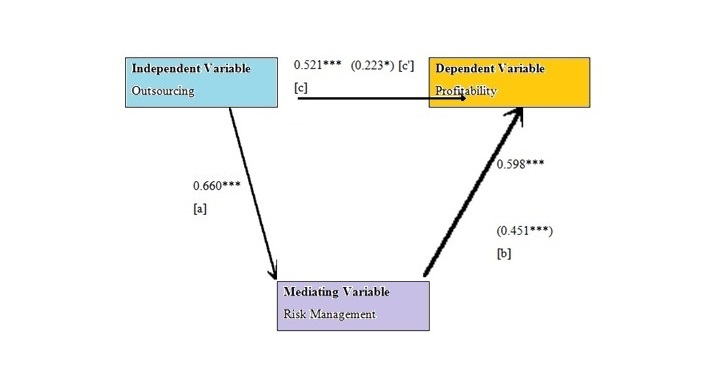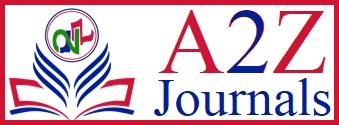Risk Management Mediates the Relationship Between Outsourcing and Profitability of Manufacturing Firms

DOI:
https://doi.org/10.54060/jmce.v3i2.33Keywords:
Outsourcing, risk management, profitability, mediation, manufacturing firms.Abstract
Over decades, manufacturing firms are struggling to remain competitive in an intense manufacturing industry. The struggle is due to increasing manufacturing companies dealing in similar or related products. Given the competitive dynamics in the manufac-turing industry, firms are proactively searching for viable strategies to ensure profitabil-ity and survival. Scholars and management have jointly conducted studies to find ami-cable strategies influencing firms’ profitability. Whereas various studies have been con-ducted on profitability, majority of these studies were concerned with strategies directly influencing profitability with little attention on the mediating role of other strategies. Specifically, little is known on mediation studies in manufacturing industry. Despite strategies directly influencing profitability being established, firms’ are in receivership with several kicked out of business indefinitely. This study bridges the gap by consider-ing the mediating role of risk management on outsourcing and profitability of manu-facturing firms. A cross-sectional research design was adopted. Specifically, a partial mediation approach was adopted following Baron and Kenny mediation guidelines. Results from Med-Graph and Sobel tests proved that risk management significantly me-diated the relationship between outsourcing and profitability (Sobel Z-value = 3.441, p = 0.002). Hence, firms are encouraged to embrace mediation strategies in ensuring prof-itability and survival in the competitive environment.
Downloads
References
M. Acquaah, & A. Agyapong, “Dynamic tensions from Management Control Systems and performance in a Sub-Saharan African Economy: Mediating effects of competitive strategy,” Africa Journal of Management, vol.2, pp.395-421, 2016.
I. Adeleye, Y. A. Debrah, & L. Nachum, L. 2019. Management of financial institutions in Africa: Emerging themes and future research agenda, Africa Journal of Management, vol.5, pp.215-230, 2019.
A. Agigi, K. Mocke, I. Carrim, et al., “Managing the dependency of focal firms on innovative suppliers: A qualitative study of automotive manufacturers in South Africa,” Africa Journal of Management, pp.31-57, 2021.
Z. Ali, B. Gongbing, A. Mehreen, et al., Predicting firm performance through supply chain finance: a moderated and mediated model link,” International Journal of Logistics Research and Applications, vol.23, pp.121-138, 2020.
U. Amakom & F. I. Amagwu, “Informal Sources of Microfinance and Profitability of Micro and Small Enterprises Clusters in South-East Nigeria,” Business Perspectives and Research, vol.8, pp.173-185, 2020.
K. A. Gyampah, M. Acquaah, E. Adaku, et al., “Social capital and project management success in a developing country environment: Mediating role of knowledge management,” Africa Journal of Management, pp.1-36, 2021.
E. K. Anin, N. Boso, D. Asamoah, “Moderating effect of supply chain complexity in governance mechanisms and operational performance relationship: Evidence from a sub-Saharan African market,” Africa Journal of Management, pp.1-23, 2021.
S. Aryee, F. O. Walumbwa, H. Gachunga, et al., “Workplace family resources and service performance: The mediating role of work engagement,” Africa Journal of Management, vol.2, pp.138-165, 2016.
R. M. Baron, & D. A. Kenny, “The moderator–mediator variable distinction in social psychological research: Conceptual, strategic and statistical considerations,” Journal of personality and social psychology, vol.51, no.6, 1173-1182, 1986.
A. Bazzoli, & M. Curcuruto, “Safety leadership and safety voices: exploring the mediation role of proactive motivations,” Journal of Risk Research, pp.1368-1387, 2020.
A. C. Cagliano, S. Grimaldi, C. Rafele, “Choosing project risk management techniques. A theoretical framework,” Journal of risk research, vol.18, pp.232-248, 2015.
C. A. Chavadi, M. Sirothiya, V. Mr, “Mediating Role of Job Satisfaction on Turnover Intentions and Job Mismatch Among Millennial Employees in Bengaluru,” Business Perspectives and Research, vol.10, no.1, 2021.
D. Choi, “The impact of media use on policy support on fine dust problem in South Korea’s atmosphere: the mediating role of attribution of responsibility and perceived risk,” Journal of Risk Research, pp.1101-1112, 2020.
D. West, O. Iheanachor, I. O. Umukoro, “Mobile money as a frugal innovation for the bottom of the pyramid–Cases of selected African countries,” Africa Journal of Management, vol.5, pp.274-302, 2019.
D. J. B. Quinn, Outsourcing Innovation: The New Engine Of Growth. Sloan Management, 2000.
K. Dhar, U. Khandelwal, “Impact of Goods and Services Tax on Supply Chain Management,” Business Perspectives and Research, 2021.
B. Ding, M. Stevenson, & J. S. Busby, “The relationship between risk control imperative and perceived causation: the case of product counterfeiting in China,” Journal of Risk Research, vol.20, pp.800-826, 2017.
A. E. Ellinger, H. Chen, Y. Tian, et al., Learning orientation, integration, and supply chain risk management in Chinese manufacturing firms,” International Journal of Logistics Research and Applications, vol.18, 476-493, 2015.
A. Fredriksson, & E. Johansson, “Integrating logistics into the outsourcing process,” International Journal of Logistics Research and Applications, vol.12, pp.281-298, 2009.
T. Gadhoke, “Multi-sector approach ensures Mukwano Group thrives despite tough climate,” Africa Journal of Management, vol.1, pp.440-445, 2015.
M. W. Hansen, “Toward a strategic management perspective on local content in African extractives: MNC procurement strategies between local responsiveness and global integration, “Africa Journal of Management, vol.6, pp.24-42, 2020.
A. F. Hayes, “Beyond Baron and Kenny Statistical mediation analysis in the new millennium,” Communication monographs, vol.76, pp.408-420, 2009.
T. R. Holcomb & M. A. Hitt, “Toward a model of strategic outsourcing,” Journal of operations management, vol.25, pp.464-481, 2007.
E. Hong, B. G. Son & D. Menachof, “Exploring the link between IT systems and the outsourcing of logistics activities: a transaction cost perspective,” International Journal of Logistics Research and Applications, vol.13, pp.41-57, 2010.
J. K. Cho, J. Ozment & H. Sink, “Logistics capability, logistics outsourcing and firm performance in an e-commerce market,” International Journal of Physical Distribution & Logistics Management, vol.38, pp.336-359, 2008.
P. Jorion, “Value at risk,” Third Edition McGraw Hill, pp.1-24, 2000.
P. E. Jose, “MedGraph I A programme to graphically depict mediation among three variables,” Victoria University of Wellington New Zealand, 2013.
A. Joshi, “Motivating sustainable behaviors by framing biodiversity loss as a public health risk,” Journal of Risk Research, vol.25, no.2, pp.156-175, 2021.
U. Jüttner, H. Peck & M. Christopher, “Supply chain risk management outlining an agenda for future research,” International Journal of Logistics Research and Applications, vol.6, no.4, pp.197-210, 2003.
R. V. Krejcie & D. W. Morgan, “Table for determining sample size from a given population,” Educational and Psychological Measurement, vol.30, pp.607-610, 1970.
M. Leaver & T. W. Reader, “Non technical skills for managing risk and performance in financial trading,” Journal of Risk Research, vol.19, no.6, pp.687-721, 2016.
T. A. Liedong & T. Rajwani, “Managerial ties and access to finance in weak institutional contexts Does CEO duality matter,” Africa Journal of Management, vol.8, no.2, pp.143-170, 2021.
D. P. Mackinnon, C. M. Lockwood, J. M. Hoffman, et al., “A comparison of methods to test mediation and other intervening variable effects,” Psychological methods, vol.7, no.1, pp.83-104, 2002.
J. E. Mathieu & S. R. Taylor, “Clarifying conditions and decision points for mediational type inferences in organizational behavior,” Journal of Organizational Behavior, vol.27, pp.1031-1056, 2006.
B. J. Meacham, “Risk‐informed performance‐based approach to building regulation,” Journal of Risk Research, vol.13, no.7, pp.877-893, 2010.
P. Muppidathi & V. R. Krishnan, “Transformational Leadership and Follower’s Perceived Group Cohesiveness Mediating Role of Follower’s Karma-yoga,” Business Perspectives and Research, vol.9, no.2, pp.269-285, 2021.
N. Mwelu, M. Moya, M. Muhwezi, et al., “Outsourcing practices and profitability levels of manufacturing firms in Uganda,” Industrial Engineering Letters, 2014.
N. Mwelu, D. M. Rulangaranga, S. Watundu, et al., “Risk management and profitability of manufacturing firms in Uganda,”Industrial Engineering Letters, vol.4, no.2, pp.49-54, 2014.
R. Narasimhan, S. Narayanan & R. Srinivasan, “Explicating the mediating role of integrative supply management practices in strategic outsourcing a case study analysis,” International Journal of Production Research, vol.48, pp.379-404, 2010.
O. I. Ichakpa, E. Cleeve, C. Amadi, Et Al., “A business case argument for corporate social responsibility disclosure in Nigeria,” Africa Journal of Management, vol.6, no.4, pp.407-418, 2020.
A. K. Panda, S. Nanda & P. Panda, “Working Capital Management Macroeconomic Impacts and Firm Profitability: Evidence from Indian SMEs,” Business Perspectives and Research, vol.9, no.1, pp.144-158, 2021.
F.H. Pandya, “Study about Awareness and Availing of Various Direct and Indirect Fiscal Incentives and its Impact on Financial and Strategic Decisions of MSMEs,” Business Perspectives and Research, vol.5, no.1, pp.36-68, 2017.
R. J. Patil, “Due date management to improve customer satisfaction and profitability,” International Journal of Logistics Research and Applications, vol.13, no.4, pp.273-289, 2010.
B. Patnaik & M. K. Shukla, “Diversity and Equality Management System and Perceived Organisational Performance: A Mediating Role of Organisational Citizenship Behaviour,” Business Perspectives and Research, vol.9, no.2, pp.215-234, 2021.
K. J. Preacher & A. F. Hayes, “SPSS and SAS procedures for estimating indirect effects in simple mediation models,” Behavior research methods, vol.36, pp.717-731, 2004.
H. Qiu, S. Weng & M. S. Wu, “The mediation of news framing between public trust and nuclear risk reactions in post-Fukushima China: A case study,” Journal of Risk Research, vol.24, no.2, pp.167-182, 2021.
H. Rogers, M. Srivastava, K. S. Pawar, et al., “Supply chain risk management in India practical insights,” International Journal of Logistics Research and Applications, vol.19, pp.278-299, 2016.
S. Salomo, J. Weise & H. G. Gemünden, “NPD planning activities and innovation performance: the mediating role of process management and the moderating effect of product innovativeness,” Journal of product innovation management, vol.24, no.6, pp.285-302, 2007.
L. Scardino, K. Potter, A. Young, et al., “Gartner on Outsourcing,” Gartner Research, vol.2, pp.1-48, 2006.
F. Schiller & G. Prpich, “Learning to organise risk management in organisations: what future for enterprise risk management,” Journal of Risk Research, vol.17, pp.999-1017, 2014.
U. Sekaran & R. Bougie , “Research methods for business: A skill building approach,” ISBN: 978-1-119-26684-6 , Wiley, pp.1-448, 2010.
S. Sengupta, S. Sharma & A. Singh, “Authentic leadership fostering creativity in start-ups: Mediating role of work engagement and employee task proactivity,” Business Perspectives and Research, vol.9, no.8, pp.235-251, 2021.
B. Sheehan, F. Murphy, A. N. Kia, et al., “A quantitative bow-tie cyber risk classification and assessment framework,” Journal of Risk Research, vol.24, no.12, pp.1619-1638, 2010.
E. Stark, A. S. Baldwin, A. W. Hertel, et al., “Understanding the framing effect: Do affective responses to decision options mediate the influence of frame on choice,” Journal of Risk Research, vol.20, no.12, pp.1585-1597, 2017.
W. A. V. D. Stede, C. W. Chow, & T.W. Lin, “Strategy choice of performance measures, and performance,” Behavioral research in accounting, vol.18, pp.185-205, 2006.
A. Stringfellow, M. B. Teagarden & W. Nie, “Invisible costs in offshoring services work,” Journal of Operations Management, vol.26, no.2, pp.164-179, 2008.
N. Syahirah, “Firm Risk and Performance of Consumer Industry: Nestle Malaysia,”2017.
I. P. Vlachos, “Reverse logistics capabilities and firm performance: the mediating role of business strategy,” International Journal of Logistics Research and Applications, vol.19, no.5, pp.424-442, 2016.
W. Waemustafa & S. Sukri, “Systematic and unsystematic risk determinants of liquidity risk between Islamic and conventional banks, vol.6, no.4, pp.1321-1327,2016.
R. D. Warburton & R. Stratton, “The optimal quantity of quick response manufacturing for an onshore and offshore sourcing model,” International Journal of Logistics: Research and Applications, vol.8, no.2, pp.125-141, 2005.
E. Wipplinger & P. Jorion, “Value at Risk-The New Benchmark for Managing Financial Risk. Financial Markets and Portfolio Management, vol.21, no.397, 2007.
X. Wu, Q. Wang, L. Wang, et al., Customer integration and the performance of third-party logistics firms: a moderated mediation model,” International Journal of Logistics Research and Applications, vol.26, no.3, pp.615-632, 2021.
Q. Yang, Q.Wang & X. Zhao, “A taxonomy of transaction-specific investments and its effects on cooperation in logistics outsourcing relationships,” International Journal of Logistics Research and Applications, vol.22, no.6, pp.557-575, 2019.

Downloads
Published
How to Cite
CITATION COUNT
Issue
Section
License
Copyright (c) 2023 Noah Mwelu, Dr. Susan Watundu, Prof. Musa Moya

This work is licensed under a Creative Commons Attribution 4.0 International License.
























